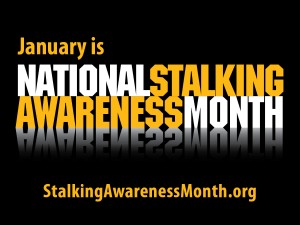Stalking Against Deaf Victims of Domestic Violence

In January 2004, the National Center for Victims of Crime launched National Stalking Awareness Month (NSAM) to increase the public’s understanding of the crime of stalking. Barrier Free Living team members Nicolyn Plummer and Michelle Reyes take a look at stalking as it relates to Deaf individuals.
Nicolyn Plummer is a senior social worker and coordinator of outreach and advocacy of the Deaf Services Initiative, in conjunction with Secret Garden and Freedom House to enhance accessibility in serving Deaf victims. Michelle Reyes is a Deaf Initiative Service Social Worker at Barrier Free Living’s Secret Garden’s non residential program and Freedom House’s domestic violence shelter. She provides individual and group counseling to adults, children and adolescents.
Stalking against Deaf individuals is underreported due to systemic barriers which include a lack of communication access and attitudinal barriers. Deaf individuals are often unable to provide accurate police reports due to a lack of interpreting services. The severity of their reports can therefore not be taken seriously.
Reports indicate that 25% of Deaf women are victims of intimate partner violence (IPV) (ADWAS, 1997), 50-83% of Deaf individuals experience sexual assault in their lifetime (Francavillo, 2009), and Deaf females are two times more likely to experience physical assault by their partner (Anderson, 2010).
Too often, Deaf victims suffer from the consequences of NOT being heard when reaching out to trusted persons, victim service providers, law enforcement and other justice system officials. Law enforcement and shelters are often not skilled at communicating with Deaf, DeafBlind or hard of hearing individuals and often don’t have interpreters.
Barrier Free Living’s Secret Garden domestic violence program works with victims of domestic violence with disabilities. The Secret Garden team provides trauma-based therapy and case management services and the program offers participants full communication access to social workers and case managers that are fluent in American Sign Language.
Secret Garden also offers various groups that that allow victims to develop self-awareness.
As members of the Secret Garden team, we are accountable to serve and provide specialized services for victims with disabilities, and we assert that it is important for all providers to understand what stalking is and how it impacts Deaf victims.
Stalking is a pattern and repeated threatening or harassing behavior indirectly or directly; communicating a threat and/or a combination of experiences that produce fear in the victim. How common is stalking?
The stalking resources center reports that 61% of female victims and 44% of males victims have been stalked by someone they know-their intimate partner or acquaintance (Baum, 2009), 76% of intimate partner femicide victims have been stalked by their intimate partner ( McFarlane, 1999).
Also:
• One in four women and one in thirteen men will be victims of stalking in their lifetime.
• 61% of female victims and 44% of male victims are stalked by current or former intimate partner.
While specifics about stalking amongst the Deaf are lacking, Deaf victims are at risk for stalking and can be unaware it is a crime. The description of stalking against the Deaf victim is overlooked due to limited knowledge and a lack of available information.
Many Deaf individuals are unknowingly being stalked and do not recognize stalking behaviors. There are three kinds of stalking behaviors.
• Erotomanic stalkers: believe the victim is in love with them.
• Simple Obsession stalkers: victim and stalker know each other.
• Love Obsession Stalkers: fantasize about the victim.
Deaf victims often encounter three types of stalkers, and have been undermined by law enforcement and justice system officials when seeking a protective order against offenders.
Cyberstalking can be telecommunication-based harassment, monitoring video phone calls, using victim’s identity to purchase items, impersonating as adult protective service (APS).
It is important to be aware of your surroundings and recognize stalking behaviors:
• Follow and spy on you
• Monitor your movements at home and work, video calls, your texts, instant messages
• Receive unwanted calls at home and work
• Use global positioning system (GPS) to track your whereabouts
• Google online to get information using public record and contact your trusted friends, relatives, co-workers, neighbors about you
• Threaten to post your intimate photos online, spread faulty rumors on Facebook, Instagram, Twitter
• Spoofing with unreal phone number and ID
• Put a “bug” in your phone
• Spyware
• Destruction of property
This is not an exhaustive list, but it is critical to devise a safety plan. Do not let system barriers prevent you from calling 911 as you know the situation better than anyone and trust your instincts.
• Change your routine and talk to trusted persons, advocates, counselors, alert the employers and security guards about your predicaments
• Obtain a restraining order from court and produce a copy with stalker’s photo to your supervisors, your counselors. Once the court issues a protective order against the perpetrator, you must carry it with you for 24/7 and provide a copy to your employers, counselors, advocates and landlords as well.
To live safely from stalking, it is important to write down the time, date, place, secure e-mails, video call messages, texts, letters, notes, photograph destructive of property stalker caused and ask witnesses to record any suspicious activities.
To find more information, please call Deaf Initiative Services at 646-350-2662.


Leave a reply